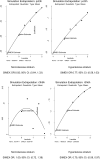n-3 Fatty acids, hypertension and risk of cognitive decline among older adults in the Atherosclerosis Risk in Communities (ARIC) study
- PMID: 17625029
- PMCID: PMC4863651
- DOI: 10.1017/S1368980007000080
n-3 Fatty acids, hypertension and risk of cognitive decline among older adults in the Atherosclerosis Risk in Communities (ARIC) study
Abstract
Objective: Recent research indicates that n-3 fatty acids can inhibit cognitive decline, perhaps differentially by hypertensive status.
Design: We tested these hypotheses in a prospective cohort study (the Atherosclerosis Risk in Communities). Dietary assessment using a food-frequency questionnaire and plasma fatty acid exposure by gas chromatography were completed in 1987-1989 (visit 1), while cognitive assessment with three screening tools--the Delayed Word Recall Test, the Digit Symbol Substitution Test of the Wechsler Adult Intelligence Scale-Revised and the Word Fluency Test (WFT)--was completed in 1990-1992 (visit 2) and 1996-1998 (visit 4). Regression calibration and simulation extrapolation were used to control for measurement error in dietary exposures.
Setting: Four US communities--Forsyth County (North Carolina), Jackson (Mississippi), suburbs of Minneapolis (Minnesota) and Washington County (Maryland).
Subjects: Men and women aged 50-65 years at visit 1 with complete dietary data (n = 7814); white men and women in same age group in the Minnesota field centre with complete plasma fatty acid data (n = 2251).
Results: Findings indicated that an increase of one standard deviation in dietary long-chain n-3 fatty acids (% of energy intake) and balancing long-chain n-3/n-6 decreased the risk of 6-year cognitive decline in verbal fluency with an odds ratio (95% confidence interval) of 0.79 (0.66-0.95) and 0.81 (0.68-0.96), respectively, among hypertensives. An interaction with hypertensive status was found for dietary long-chain n-3 fatty acids (g day-1) and WFT decline (likelihood ratio test, P = 0.06). This exposure in plasma cholesteryl esters was also protective against WFT decline, particularly among hypertensives (OR = 0.51, P < 0.05).
Conclusion: One implication from our study is that diets rich in fatty acids of marine origin should be considered for middle-aged hypertensive subjects. To this end, randomised clinical trials are needed.
Conflict of interest statement
Conflict of interest: None
Figures

References
-
- United Nations. World Population Prospects: The 2002 revision. 2002.
-
- Morris MC, Evans DA, Bienias JL, Tangney CC, Bennett DA, Wilson RS, et al. Consumption of fish and n-3 fatty acids and risk of incident Alzheimer disease. Arch Neurol. 2003;60(7):940–6. - PubMed
-
- Kalmijn S, van Boxtel MP, Ocke M, Verschuren WM, Kromhout D, Launer LJ. Dietary intake of fatty acids and fish in relation to cognitive performance at middle age. Neurology. 2004;62(2):275–80. - PubMed
-
- Kalmijn S, Feskens EJ, Launer LJ, Kromhout D. Polyunsaturated fatty acids, antioxidants, and cognitive function in very old men. Am J Epidemiol. 1997;145(1):33–41. - PubMed
-
- Youdim KA, Martin A, Joseph JA. Essential fatty acids and the brain: possible health implications. Int J Dev Neurosci. 2000;18(4-5):383–99. - PubMed
Publication types
MeSH terms
Substances
Grants and funding
- N01 HC055016/HL/NHLBI NIH HHS/United States
- N01 HC055021/HL/NHLBI NIH HHS/United States
- N01 HC055015/HL/NHLBI NIH HHS/United States
- N01 HC 55022/HC/NHLBI NIH HHS/United States
- N01 HC055020/HL/NHLBI NIH HHS/United States
- N01 HC 55019/HC/NHLBI NIH HHS/United States
- N01 HC 55016/HC/NHLBI NIH HHS/United States
- N01 HC 55015/HC/NHLBI NIH HHS/United States
- N01 HC055018/HL/NHLBI NIH HHS/United States
- N01 HC055022/HL/NHLBI NIH HHS/United States
- N01 HC 55020/HC/NHLBI NIH HHS/United States
- N01 HC 55018/HC/NHLBI NIH HHS/United States
- N01 HC055019/HL/NHLBI NIH HHS/United States
- Z99 AG999999/ImNIH/Intramural NIH HHS/United States
- N01 HC 55021/HC/NHLBI NIH HHS/United States
LinkOut - more resources
Full Text Sources
Medical

